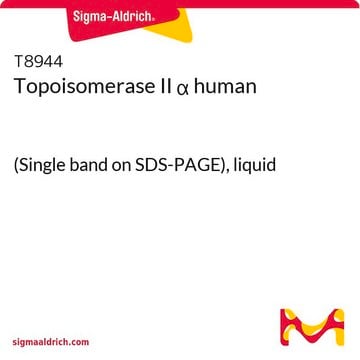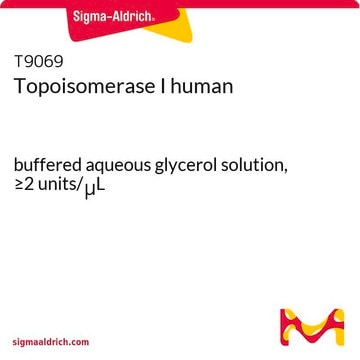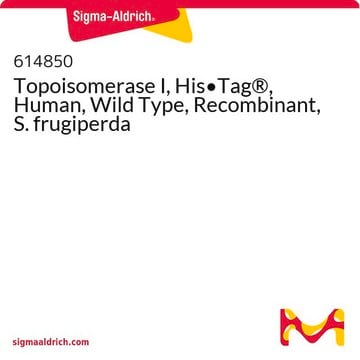D0690
DNA Gyrase from Escherichia coli
aqueous glycerol solution
Přihlásitk zobrazení cen stanovených pro organizaci a smluvních cen
About This Item
MDL number:
UNSPSC Code:
12352204
NACRES:
NA.54
Doporučené produkty
biological source
Escherichia coli
Quality Level
form
aqueous glycerol solution
mol wt
~374 kDa
concentration
≥2 unit/μL
technique(s)
cell based assay: suitable
application(s)
cell analysis
shipped in
dry ice
storage temp.
−70°C
Gene Information
Escherichia coli K12 ... gyrA(946614) , gyrB(948211)
Application
DNA gyrase from Escherichia coli has been used in a study to investigate a comparative proteomic approach to better define Deinococcus nucleoid specificities. DNA gyrase from Escherichia coli has also been used in a study to investigate the role of the DnaK-ClpB bichaperone system in DNA gyrase reactivation.
Biochem/physiol Actions
DNA gyrase is supplied as an A2B2 holoenzyme. The molecular mass of subunit A is 97 kDa and that of subunit B is 90 kDa. It catalyzes the ATP-dependent introduction of negative supercoils into relaxed DNA. DNA gyrase has been successfully converted into a type II topoisomerase by mutagenesis experiments.
Can be used to supercoil plasmids.
Unit Definition
One unit of gyrase activity will supercoil 0.5 micrograms of pBR-322 DNA in 30 minutes at 37 °C.
Other Notes
Solution in 50% Glycerol containing Tris buffer, DTT and EDTA.
Storage Class
10 - Combustible liquids
wgk_germany
WGK 1
flash_point_f
Not applicable
flash_point_c
Not applicable
Osvědčení o analýze (COA)
Vyhledejte osvědčení Osvědčení o analýze (COA) zadáním čísla šarže/dávky těchto produktů. Čísla šarže a dávky lze nalézt na štítku produktu za slovy „Lot“ nebo „Batch“.
Již tento produkt vlastníte?
Dokumenty související s produkty, které jste v minulosti zakoupili, byly za účelem usnadnění shromážděny ve vaší Knihovně dokumentů.
S C Kampranis et al.
Proceedings of the National Academy of Sciences of the United States of America, 93(25), 14416-14421 (1996-12-10)
DNA gyrase is unique among topoisomerases in its ability to introduce negative supercoils into closed-circular DNA. We have demonstrated that deletion of the C-terminal DNA-binding domain of the A subunit of gyrase gives rise to an enzyme that cannot supercoil
Magali Toueille et al.
Journal of proteomics, 75(9), 2588-2600 (2012-03-27)
Compared to radiation-sensitive bacteria, the nucleoids of radiation-resistant Deinococcus species show a higher degree of compaction. Such a condensed nucleoid may contribute to the extreme radiation resistance of Deinococcus by limiting dispersion of radiation-induced DNA fragments. Architectural proteins may play
Teresa Lara-Ortíz et al.
Canadian journal of microbiology, 58(2), 195-199 (2012-01-24)
In Escherichia coli cells, an increase in temperature induces immediate DNA relaxation, followed by the fast recovery of DNA supercoiling. DNA gyrase, proteins synthesized during heat stress, and chaperone DnaK have been proposed to participate in this recovery. However, the
Alix Pantel et al.
Antimicrobial agents and chemotherapy, 56(4), 1990-1996 (2012-02-01)
Fluoroquinolone (FQ) resistance is emerging in Mycobacterium tuberculosis. The main mechanism of FQ resistance is amino acid substitution within the quinolone resistance-determining region (QRDR) of the GyrA subunit of DNA gyrase, the sole FQ target in M. tuberculosis. However, substitutions
PTTG1 expression and it's rapidly evolving role in the progression and development of systemic malignancies.
Journal of experimental therapeutics & oncology, 10(2), 163-164 (2013-01-29)
Náš tým vědeckých pracovníků má zkušenosti ve všech oblastech výzkumu, včetně přírodních věd, materiálových věd, chemické syntézy, chromatografie, analytiky a mnoha dalších..
Obraťte se na technický servis.







